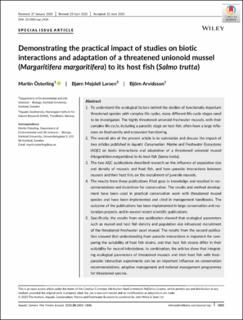Demonstrating the practical impact of studies on biotic interactions and adaptation of a threatened unionoid mussel (Margaritifera margaritifera) to its host fish (Salmo trutta)
Peer reviewed, Journal article
Published version

View/
Date
2020Metadata
Show full item recordCollections
- Publikasjoner fra CRIStin - NINA [2364]
- Scientific publications [1392]
Abstract
conservation evaluation, fish, invertebrates, stream 1. To understand the ecological factors behind the decline of functionally important
threatened species with complex life cycles, many different life-cycle stages need
to be investigated. The highly threatened unionoid freshwater mussels, with their
complex life cycle, including a parasitic stage on host fish, often have a large influence
on biodiversity and ecosystem functioning.
2. The overall aim of the present article is to summarize and discuss the impact of
two articles published in Aquatic Conservation: Marine and Freshwater Ecosystems
(AQC) on biotic interactions and adaptation of a threatened unionoid mussel
(Margaritifera margaritifera) to its host fish (Salmo trutta).
3. The two AQC publications described research on the influence of population size
and density of mussels and host fish, and host–parasite interactions between
mussels and their host fish, on the recruitment of juvenile mussels.
4. The results from these publications filled gaps in knowledge and resulted in recommendations
and incentives for conservation. The results and method development
have been used in practical conservation work with threatened mussel
species and have been implemented and cited in management handbooks. The
outcome of the publications has been implemented in large conservation and restoration
projects, and in several recent scientific publications.
5. Specifically, the results from one publication showed that ecological parameters
such as mussel and host fish density and population size influenced recruitment
of the threatened freshwater pearl mussel. The results from the second publication
showed that understanding host–parasite interactions is important for comparing
the suitability of host fish strains, and that host fish strains differ in their
suitability for mussel infestations. In combination, the articles show that integrating
ecological parameters of threatened mussels and their host fish with host–
parasite interaction experiments can be an important influence on conservation
recommendations, adaptive management and national management programmes
for threatened species.
